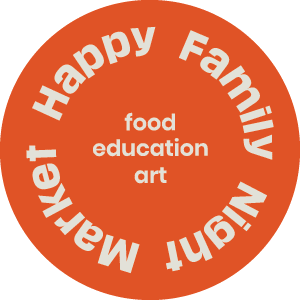FAQ

Happy Family began as a one-night-only experimental “night market” and has since grown into an annual festival and grassroots community organization that offers year-round programming including pop-up events, a radio show, and an online cookbook.
We are based in NYC, but we do not have a physical office that is open to the public. Our team works remotely. We partner with mission-aligned venues to host our in-person meetings and events.
Although we are not a for-hire event production company, we will consider requests to consult on programming and production on a case-by-case basis. See the Partnerships page.
Although we are not a catering company, we will consider requests to consult on caterers from our community on a case-by-case basis. See the Partnerships page.
Although we are not a talent agency, we will consider requests to consult on artists, chefs, and creatives from our community on a case-by-case basis. See the Partnerships page.
We have not yet set a date for our 3rd annual festival, but we encourage you to subscribe to our newsletter to be the first to know!
Fill out the submission form on the Contact page.
Fill out the volunteer form on the Contact page.
Email our Publishing Director Media Farzin. See the Contact page. Please note: in most cases, we need at least 3 weeks’ advance notice to respond to a request and schedule an interview.
We are currently a fiscally sponsored project of the New York Foundation for the Arts (NYFA), a 501(c)(3), tax-exempt organization founded in 1971, and one of the oldest and most reputable fiscal sponsors in the country. As such, we are eligible to receive tax-exempt donations and grants through our fiscal sponsor, NYFA. But we are technically not a nonprofit; we are a Co-op.
Depending on the event, tickets may be sold online via our website, or the venue’s website. Tickets may also be purchased in-person at the venue on the day of the event.
Happy Family Night Market is named after a Chinese American dish called “Happy Family,” a mixture of a diversity of meats, vegetables, and seafoods to create a harmonious whole. The name of the night market was a very early decision made by two of the five original festival co-producers, and it stuck.
A “night market” is an open-air street market that operates at night. Night markets have been documented as far back in history as 600 AD (Tang dynasty China) and the earliest established, longest-running night markets are located throughout East and Southeast Asia. Some of the most legendary night markets can be found in Taiwan, Hong Kong, Thailand, Cambodia, Vietnam, Singapore, Malaysia, Indonesia, and the Philippines.
Many American entrepreneurs have capitalized on the popularity of this format, and appropriated the concept of a night market without acknowledging its history and origin. The word “bazaar” (Persian: بازار) has also often been used interchangeably with the term “night market”, however bazaar refers to a more general marketplace (in Central, Western, and South Asia) that may or may not be open at night.
As an Asian-centered organization, we hope to acknowledge and honor the unique culture and tradition of Asian night markets, while still allowing room for innovation and experimentation.
We acknowledge there are multiple disputed definitions of “Asian”, and encourage our community to question and reflect on the conflicting ethnic, racial, cultural, and geopolitical definitions of Asia. We respect however individuals self-identify and do not intend to impose our definitions on anyone.
We include in our definition: any individual who self-identifies as Asian, Asian American, Asian [insert nationality here] (or vice versa), a member of an indigenous group historically located in what is now commonly referred to as Asia, a foreign-born person of Asian heritage, adoptees of Asian descent, and multi-racial people with Asian ancestry.
We include individuals who identify as Pacific Islanders, however we also acknowledge that Pacific Islander people may or may not self-identify as Asian, and therefore may or may not wish to be included and identified as such.
Although we are committed to centering Asian voices in our programming and leadership roles, there are many ways to participate as a non-Asian person! Opportunities include: attending an event, volunteering at an event, or partnering with our organization to support our work.